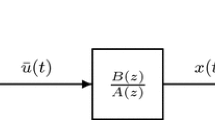Abstract
A hierarchical recursive least squares algorithm is presented in the paper to estimate the parameters of Hammerstein nonlinear systems by combining the filtering method and least squares search principle. The key is to decompose the Hammerstein system into two subsystems by adopting the hierarchical idea. Numerical examples are given to illustrate the performance of the proposed algorithm.



Similar content being viewed by others
References
Ding, F.: System Identification: New Theory and Methods. Science Press, Beijing (2013)
Ho, W.H., Chou, J.H., Guo, C.Y.: Parameter identification of chaotic systems using improved differential evolution algorithm. Nonlinear Dyn. 61(1–2), 29–41 (2010)
Sun, J.L., Liu, X.G.: A novel APSO-aided maximum likelihood identification method for Hammerstein systems. Nonlinear Dyn. 73(1–2), 449–462 (2013)
Kolodziej, J.R., Mook, D.J.: Model determination for nonlinear state-based system identification. Nonlinear Dyn. 63(4), 735–753 (2011)
Ding, F.: Combined state and least squares parameter estimation algorithms for dynamic systems. Appl. Math. Model. 38(1), 403–412 (2014)
Ding, F.: State filtering and parameter identification for state space systems with scarce measurements. Signal Process. (2014). doi:10.1016/j.sigpro.2014.03.031
Wang, D.Q., Ding, F., Liu, X.M.: Least squares algorithm for an input nonlinear system with a dynamic subspace state space model. Nonlinear Dyn. 75(1–2), 49–61 (2014)
Dehghan, M., Hajarian, M.: SSHI methods for solving general linear matrix equations. Eng. Comput. 28(8), 1028–1043 (2011)
Dehghan, M., Hajarian, M.: Fourth-order variants of Newton’s method without second derivatives for solving non-linear equations. Eng. Comput. 29(4), 356–365 (2012)
Dehghan, M., Hajarian, M.: Iterative algorithms for the generalized centro-symmetric and central anti-symmetric solutions of general coupled matrix equations. Eng. Comput. 29(5), 528–560 (2012)
Ahmad, M.S., Kukrer, O., Hocanin, A.: Recursive inverse adaptive filtering algorithm. Digit. Signal Process. 21(4), 491–496 (2011)
Wang, D.Q.: Least squares-based recursive and iterative estimation for output error moving average systems using data filtering. IET Control Theory Appl. 5(14), 1648–1657 (2011)
Fan, D., Lo, K.: Identification for disturbed MIMO Wiener systems. Nonlinear Dyn. 55(1–2), 31–42 (2009)
Yu, B., Shi, Y., Huang, H.: H\_2 and H\_infinity filtering for multirate systems using lifted models. Circuits Syst. Signal Process. 27(5), 699–711 (2008)
Wang, D.Q., Ding, F.: Input–output data filtering based recursive least squares parameter estimation for CARARMA systems. Digit. Signal Process. 20(4), 991–999 (2010)
Wang, D.Q., Ding, F., Chu, Y.Y.: Data filtering based recursive least squares algorithm for Hammerstein systems using the key-term separation principle. Inf. Sci. 222(2), 203–212 (2013)
Li, H., Shi, Y.: Robust H-infty filtering for nonlinear stochastic systems with uncertainties and random delays modeled by Markov chains. Automatica 48(1), 159–166 (2012)
Wang, D.Q., Ding, F.: Hierarchical least squares estimation algorithm for Hammerstein–Wiener systems. IEEE Signal. Process. Lett. 19(12), 825–828 (2012)
Li, J.H.: Parameter estimation for Hammerstein CARARMA systems based on the Newton iteration. Appl. Math. Lett. 26(1), 91–96 (2013)
Yu, L., Zhang, J.B., Liao, Y.W., Ding, J.: Parameter estimation error bounds for Hammerstein finite impulsive response models. Appl. Math. Comput. 202(2), 472–480 (2008)
Bai, E.W., Li, D.: Convergence of the iterative Hammerstein system identification algorithm. IEEE Trans. Autom. Control 49(11), 1929–1940 (2004)
Liu, Y., Bai, E.W.: Iterative identification of Hammerstein systems. Automatica 43(2), 346–354 (2007)
Bai, E.: An optimal two-stage identification algorithm for Hammerstein–Wiener nonlinear systems. Automatica 34(3), 333–338 (1998)
Ding, F., Chen, T.: Identification of Hammerstein nonlinear ARMAX systems. Automatica 41(9), 1479–1489 (2005)
Xiao, Y.S., Yue, N.: Parameter estimation for nonlinear dynamical adjustment models. Math. Comput. Model. 54(5–6), 1561–1568 (2011)
Ding, F., Liu, X.P., Liu, G.: Identification methods for Hammerstein nonlinear systems. Digit. Signal Process. 21(2), 215–238 (2011)
Shi, Y., Yu, B.: Robust mixed H\_2/H\_infinity control of networked control systems with random time delays in both forward and backward communication links. Automatica 47(4), 754–760 (2011)
Shi, Y., Yu, B.: Output feedback stabilization of networked control systems with random delays modeled by Markov chains. IEEE Trans. Autom. Control 54(7), 1668–1674 (2009)
Ding, F., Qiu, L., Chen, T.: Reconstruction of continuous-time systems from their non-uniformly sampled discrete-time systems. Automatica 45(2), 324–332 (2009)
Zhang, Y., Cui, G.M.: Bias compensation methods for stochastic systems with colored noise. Appl. Math. Model. 35(4), 1709–1716 (2011)
Zhang, Y.: Unbiased identification of a class of multi-input single-output systems with correlated disturbances using bias compensation methods. Math. Comput. Model. 53(9–10), 1810–1819 (2011)
Ding, J., Fan, C.X., Lin, J.X.: Auxiliary model based parameter estimation for dual-rate output error systems with colored noise. Appl. Math. Model. 37(6), 4051–4058 (2013)
Ding, F.: Hierarchical parameter estimation algorithms for multivariable systems using measurement. Inf. Sci. (2014). http://dx.doi.org/10.1016/j.ins.2014.02.103
Liu, Y.J., Ding, F., Shi, Y.: An efficient hierarchical identification method for general dual-rate sampled-data systems. Automatica 50(3), 962–973 (2014)
Acknowledgments
This work was supported in part by the National Natural Science Foundation of China (Nos. 61174032, 61202473), the Doctoral Foundation of Higher Education Priority Fields of Scientific Research (No. 20110093130001).
Author information
Authors and Affiliations
Corresponding author
Rights and permissions
About this article
Cite this article
Wang, Z., Wang, Y. & Ji, Z. Hierarchical recursive least squares algorithm for Hammerstein systems using the filtering method. Nonlinear Dyn 77, 1773–1781 (2014). https://doi.org/10.1007/s11071-014-1416-z
Received:
Accepted:
Published:
Issue Date:
DOI: https://doi.org/10.1007/s11071-014-1416-z




